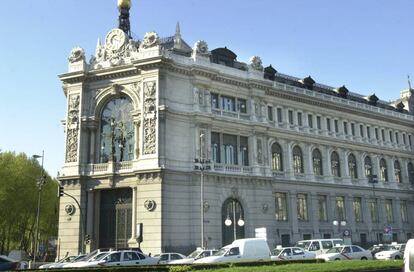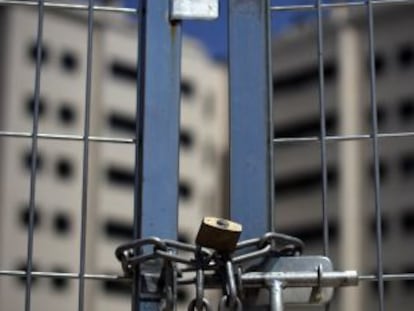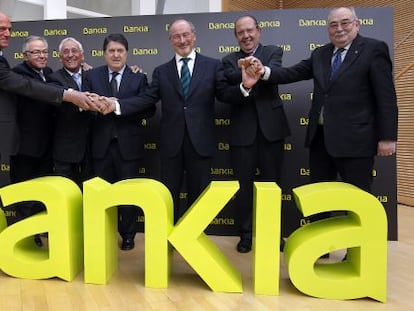Spain recoups just 5% of €51.3 billion bank restructuring cost
Some four-fifths of the bill was financed by the European Central Bank’s €40bn bailout in 2012

The cost to Spanish taxpayers of restructuring the country’s banking sector since 2009 has been €51.3 billion, of which just 5%, or €2.7 billion, has been recovered so far. That’s according to a report released on Tuesday by the Bank of Spain.
The total figure includes the €40 billion lent to the country in June 2012 by the European Central Bank in order to stave off a disaster in the sector, which was struggling at the time due to the global financial crisis and the meltdown of the country’s construction and real estate markets.
€40 billion was lent to the country in June 2012 by the European Central Bank in order to stave off a disaster in the sector
“Since 2009, the state has, through the FROB, provided public funds amounting to €53.553 billion as financial assistance for the restructuring of the Spanish banking system in various forms of capital,” says the Bank of Spain’s report. “When the €2,250 million provided by the FGDEC [Deposit Guarantee Funds, provided by Spain’s banks] are taken into account, this figure falls to €51.303 billion, of which €2.686 billion have been recouped to date.”
The central bank highlights that the bill for the bank bailout refers only to the cost to the state – in other words, that the losses suffered by investors and individuals are not included.
The report organizes state aid for Spain’s banking system into five categories.
The first covers financial aid disbursed to recapitalize banks. This includes the €51.3 billion, of which €2.7 billion has been recovered.
The second section covers the amounts provided by the Credit Institutions Deposit Guarantee Fund (FGDEC). The FGDEC set in place a procedure for providing liquidity, namely by purchasing unlisted shares from retail investors in banks controlled by the Orderly Bank Restructuring Fund (FROB). The funds committed by the FGDEC in this connection totaled €1.803 billion. The FGDEC has sold all these shares, receiving €673 million for them.
The central bank highlights that the bill for the bank bailout refers only to the cost to the state, and that losses suffered by individuals are not included
The third category refers to the guarantees granted by the state to credit institutions and to the guarantees granted to the purchaser, in the sales of institutions, and that are essentially asset protection schemes. “As of December 31, 2015, the present value of the aggregate loss currently expected from asset protection schemes amounted to €10.390 billion, provisioning for which is in the financial statements of the FGDEC and the FROB. Of this amount, €918 million corresponds to the FROB. No loss from these guarantees will foreseeably arise for the state,” says the Bank of Spain.
The fourth category comprises the extraordinary credit lines granted to banks in some of the restructuring processes from 2009 to 2013. This credit was granted as an urgent, temporary provision of liquidity either by the Bank of Spain (€9.800 billion), through the emergency liquidity assistance mechanism, backed by a state guarantee or by assets of the recipient bank itself, or by the FROB (€6.500 billion). “All the amounts drawn down on these credit facilities have been repaid and the lines have been cancelled following the recapitalization or, where appropriate, the sale of the beneficiary institutions,” says the report.
Finally, in the fifth category, is the contribution of public funds from the FROB to Sareb, the so-called “bad bank” set up in 2012, which amounted to €2,192 million, and of the public guarantees granted by the State on debt issued by Sareb for an amount of €43.476 million.
English edition by Nick Lyne.
Tu suscripción se está usando en otro dispositivo
¿Quieres añadir otro usuario a tu suscripción?
Si continúas leyendo en este dispositivo, no se podrá leer en el otro.
FlechaTu suscripción se está usando en otro dispositivo y solo puedes acceder a EL PAÍS desde un dispositivo a la vez.
Si quieres compartir tu cuenta, cambia tu suscripción a la modalidad Premium, así podrás añadir otro usuario. Cada uno accederá con su propia cuenta de email, lo que os permitirá personalizar vuestra experiencia en EL PAÍS.
En el caso de no saber quién está usando tu cuenta, te recomendamos cambiar tu contraseña aquí.
Si decides continuar compartiendo tu cuenta, este mensaje se mostrará en tu dispositivo y en el de la otra persona que está usando tu cuenta de forma indefinida, afectando a tu experiencia de lectura. Puedes consultar aquí los términos y condiciones de la suscripción digital.










































